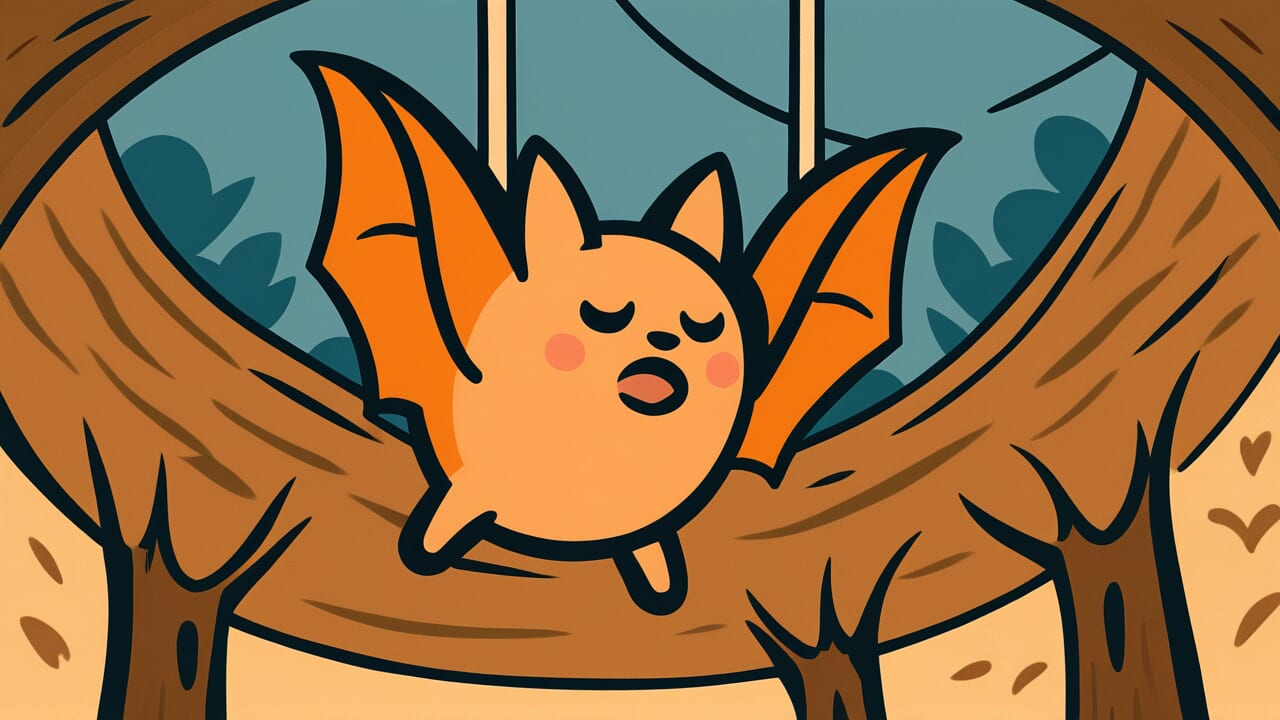How to Read “As blind as a bat”
As blind as a bat
[az BLIND az uh BAT]
All words are common and easy to pronounce.
Meaning of “As blind as a bat”
Simply put, this proverb means someone has very poor eyesight or cannot see well at all.
The saying compares a person’s vision to that of a bat. Most people think bats cannot see very well. When we say someone is “as blind as a bat,” we mean their eyesight is terrible. The phrase suggests they might bump into things or miss obvious details.
We use this expression in everyday situations quite often. Someone might say it when they cannot find their glasses. A person squinting at a menu in dim light might joke about being blind as a bat. Friends tease each other with this phrase when someone misses something right in front of them.
What makes this saying interesting is that it is actually wrong about bats. Real bats can see just fine in most cases. They use sound to navigate in the dark, but their eyes work normally. This shows how sayings can stick around even when the facts behind them are not quite right.
Origin and Etymology
The exact origin of this phrase is not completely clear. However, it appears in English writing from several centuries ago. The saying became popular because people observed bats flying at night and assumed they could not see.
During earlier times, people did not understand how bats actually navigate in darkness. They watched these creatures fly around at night and crash into things occasionally. This led to the belief that bats had poor vision. The comparison seemed logical based on what people could observe.
The phrase spread through common speech over many generations. It became a standard way to describe poor eyesight in English-speaking countries. Even as people learned more about how bats actually see and navigate, the saying remained popular. Sometimes old expressions continue to be used long after the original reasoning behind them changes.
Interesting Facts
Bats actually have perfectly good eyesight and are not blind at all. Most bat species can see as well as other mammals of similar size. They use echolocation to navigate in complete darkness, which is why people thought they could not see.
The phrase demonstrates how folk wisdom sometimes gets the science wrong. Many animals that are active at night developed excellent hearing and other senses. This does not mean their vision is poor during daylight hours.
Usage Examples
- Mother to child: “You walked right past your backpack on the table – as blind as a bat.”
- Coworker to colleague: “He couldn’t find his glasses while wearing them – as blind as a bat.”
Universal Wisdom
This saying reveals something fascinating about how humans understand the world around them. We often judge others based on incomplete information, just like our ancestors judged bats. When we cannot fully understand how someone else operates, we sometimes assume they are lacking in some way.
The persistence of this phrase shows how quickly we form explanations for things we observe. Early humans watched bats flying erratically at night and created a simple story to explain the behavior. They did not realize these creatures were using an incredibly sophisticated navigation system. This reflects a deeper human tendency to fill gaps in our knowledge with assumptions that seem reasonable at the time.
What makes this particularly interesting is how the saying survived even after we learned the truth about bats. This suggests that once an idea becomes part of our language, it takes on a life of its own. The phrase stopped being about actual bats and became simply a way to describe poor vision. Human communication often works this way, where the original meaning matters less than the shared understanding we build around certain words and phrases.
When AI Hears This
Humans rank their senses like a ladder, with sight at the top. They judge everyone else using this same ladder. When someone lacks their favorite sense, humans assume total weakness. But they miss the amazing abilities that grow in place of sight. Bats develop sound skills so advanced that humans cannot even imagine them.
This pattern shows up everywhere in human thinking. People always measure others against their own strongest abilities. They cannot see talents that work differently from their own. This creates a strange blind spot in human judgment. They call others limited while missing their hidden superpowers completely.
What strikes me most is how this mistake actually protects humans. Quick judgments help them make fast decisions in a complex world. They sacrifice accuracy for speed, which often keeps them safe. Their flawed thinking creates useful shortcuts, even when those shortcuts miss the truth. Sometimes being wrong in predictable ways works better than being perfectly right.
Lessons for Today
Understanding this phrase teaches us to question our assumptions about others. Just because someone appears to struggle with something does not mean they lack ability entirely. They might be using different methods or facing challenges we cannot see. Like bats navigating with sound instead of sight, people often have hidden strengths that compensate for apparent weaknesses.
In relationships and work situations, this wisdom becomes especially valuable. When someone approaches a problem differently than we would, our first instinct might be to assume they are confused or incapable. However, they could be using skills or knowledge we do not recognize. Taking time to understand their methods often reveals capabilities we initially missed.
The phrase also reminds us that language shapes how we think about the world. Once we label something or someone in a particular way, that label can stick around long after circumstances change. Being aware of this helps us stay open to new information and avoid getting trapped by outdated assumptions. Sometimes the most important step is simply asking whether our quick judgments reflect reality or just familiar ways of thinking.



Comments